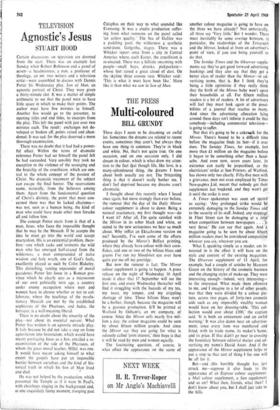Agnostic's Jesus
TELEVISION STUART HOOD
Certain discussions on television are doomed from the start. There was an example last Sunday when Robert Robinson and a panel of seven—a headmistress, a nun, a professor of theology, an MP, two writers and a television critic—were assembled to discuss with Dennis Potter his Wednesday play, Son of Man, an agnostic portrait of Christ. They were given a thirty-minute slot. It was a matter of simple arithmetic to see that the panel were to have little space in which to make their points. The author must have five minutes to himself. Another five would go to the presenter, to opening titles and end titles, to excerpts from the play. This left the panel with just over two minutes each. The result: exchanges not de- veloped or broken off, points raised and aban- doned. It was sad, for the play deserved a more thorough examination.
There was no doubt that it had had a power- ful effect. Within the terms of dramatic reference Potter had set himself the panel felt be had succeeded. Very sensibly they took no exception to the violence of the scourging and the brutality of the crucifixion, which are cen- tral to the whole concept of the passion of Christ. No dramatic treatment of the subject can escape the final horror. The reservations came, naturally, from the believers among them. Apart from the fundamental question of Christ's divinity, the point that most con- cerned them was that he lacked charisma— was not, seen as a human being, the kind of man who could have made other men forsake all and follow him.
The concept Potter starts from is that of a man, Jesus; who faces the impossible thought that he may be the Messiah. If he accepts the idea he must go into the world and accept martyrdom. His is an existential problem, there- fore—one which racks and torments the wild man who has emerged half-crazed from the wilderness, a man compounded of naive wisdom and holy wrath, one of God's fools, excellently played as such by Colin Blakeley. This disturbing, ranting expounder of moral paradoxes Potter lets loose in a Roman pro- vince which he clearly sees as a microcosm of our own politically torn age, a country under enemy occupation where men and women have to choose whether or not to col- laborate, where the teachings of the revolu- tionary Messiah are met by the established sophistries of the Pharisees, and Judas, the betrayer, is a well-meaning liberal.
There is no doubt about the sincerity of the play—nor about its essential naiveté. What Potter has _written is an agnostic miracle play. It fails because he did not take a step on from agnosticism into historicism, which would have meant portiaying Jesus as a Jew, entailed a re- examination of the role of the Pharisees, of whom the great moral teacher, Hillel, was one. It would have meant asking himself to what extent the gospels have put an impossible barrier between ourselves and the kind of his- torical truth in which his Son of Man lived and died.
He was not helped by the production, which presented the Temple as if it were St Paul's, with choirboys singing in the background and, at one exquisitely funny moment, trooping past Caiaphas on their way to what sounded like Evensong. It was a studio production suffer- ing from what someone on the panel called 'an airless quality.' The Sea of Galilee was a paddling pool, the wilderness .a synthetic sand-dune. Golgotha, stagey. There was a Whicker report once from a city in Central America where, each Easter, the crucifixion is re-enacted. There was a hillside swarming with people—small boys, drunks, pickpockets— whose feet raised a great cloud of dust. On the skyline three crosses rose. Whicker said: `This is what it must have been like.' More like it than what we saw in Son of Man.










































 Previous page
Previous page